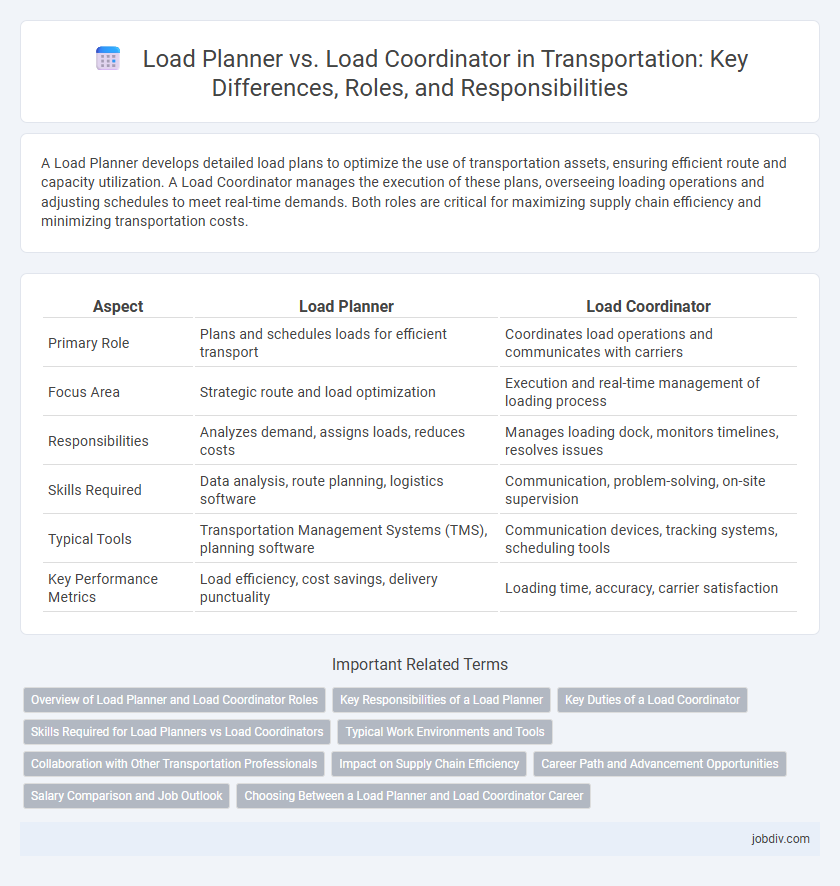A Load Planner develops detailed load plans to optimize the use of transportation assets, ensuring efficient route and capacity utilization. A Load Coordinator manages the execution of these plans, overseeing loading operations and adjusting schedules to meet real-time demands. Both roles are critical for maximizing supply chain efficiency and minimizing transportation costs.
Table of Comparison
| Aspect | Load Planner | Load Coordinator |
|---|---|---|
| Primary Role | Plans and schedules loads for efficient transport | Coordinates load operations and communicates with carriers |
| Focus Area | Strategic route and load optimization | Execution and real-time management of loading process |
| Responsibilities | Analyzes demand, assigns loads, reduces costs | Manages loading dock, monitors timelines, resolves issues |
| Skills Required | Data analysis, route planning, logistics software | Communication, problem-solving, on-site supervision |
| Typical Tools | Transportation Management Systems (TMS), planning software | Communication devices, tracking systems, scheduling tools |
| Key Performance Metrics | Load efficiency, cost savings, delivery punctuality | Loading time, accuracy, carrier satisfaction |
Overview of Load Planner and Load Coordinator Roles
Load planners develop efficient transportation plans by analyzing shipment requirements, routing options, and carrier capacity to optimize load performance and reduce costs. Load coordinators execute these plans by managing real-time scheduling, tracking shipments, and resolving operational issues to ensure timely delivery and coordination among drivers and dispatchers. Both roles are integral to supply chain logistics, ensuring seamless movement of goods from origin to destination.
Key Responsibilities of a Load Planner
Load Planners analyze shipment requirements and optimize load configurations to maximize transportation efficiency and reduce costs. They coordinate with carriers, warehouse teams, and dispatchers to ensure timely loading schedules and compliance with safety regulations. Load Planners also monitor load performance metrics and adjust plans to enhance route utilization and minimize delays.
Key Duties of a Load Coordinator
A Load Coordinator manages the scheduling and communication between shippers, drivers, and receivers to ensure timely and efficient freight transportation. They oversee load assignments, track shipments in real-time, and resolve any logistical issues that arise during transit. Their key duties include optimizing route planning, coordinating loading and unloading times, and maintaining detailed shipment documentation for compliance and reporting purposes.
Skills Required for Load Planners vs Load Coordinators
Load Planners require strong analytical skills, attention to detail, and proficiency in route optimization software to efficiently allocate shipments and maximize load capacity. Load Coordinators need excellent communication abilities, multitasking skills, and a deep understanding of logistics to manage schedules, coordinate with drivers, and resolve delivery issues. Both roles demand problem-solving capabilities, but Load Planners focus more on strategic planning while Load Coordinators emphasize operational execution.
Typical Work Environments and Tools
Load planners typically operate within logistics companies, freight brokers, and large-scale distribution centers, using transportation management systems (TMS), route optimization software, and load optimization tools to efficiently allocate freight. Load coordinators commonly work in warehouses, shipping yards, and carrier terminals, utilizing communication platforms, load tracking software, and scheduling applications to coordinate pickup and delivery operations. Both roles rely heavily on real-time data analysis and collaboration tools to ensure timely and cost-effective transportation management.
Collaboration with Other Transportation Professionals
Load planners collaborate closely with dispatchers, carriers, and warehouse managers to optimize load configurations and ensure efficient transportation schedules. Load coordinators communicate regularly with drivers, customer service teams, and freight brokers to track shipments, resolve issues, and maintain seamless delivery operations. Both roles require effective teamwork to align logistics strategies and enhance overall supply chain performance.
Impact on Supply Chain Efficiency
Load planners optimize shipment consolidation and route planning, reducing transportation costs and improving delivery times. Load coordinators focus on real-time load execution and communication between carriers and shippers, ensuring smooth operations and load accuracy. Together, their roles enhance overall supply chain efficiency by minimizing delays and maximizing resource utilization.
Career Path and Advancement Opportunities
Load Planners typically advance into senior logistics management roles by leveraging their expertise in route optimization and freight allocation, capitalizing on data analysis skills to enhance supply chain efficiency. Load Coordinators often progress toward operations management or dispatcher supervisor positions, honing their abilities in real-time load tracking and communication between drivers and clients. Both career paths offer growth opportunities in transportation management, with Load Planners focusing more on strategic planning and Load Coordinators emphasizing operational execution.
Salary Comparison and Job Outlook
Load Planners typically earn a median salary of $65,000 annually, reflecting their strategic role in optimizing freight loads, while Load Coordinators average around $50,000 due to their focus on operational execution. The job outlook for Load Planners is projected to grow by 7% over the next decade, driven by increasing demand for efficient supply chain management, whereas Load Coordinators face a steadier 4% growth rate aligned with ongoing logistics support needs. Both positions are critical in transportation, but Load Planners generally command higher salaries and stronger job growth due to their specialized planning responsibilities.
Choosing Between a Load Planner and Load Coordinator Career
Choosing between a load planner and a load coordinator career depends on your preference for strategic planning versus operational execution within transportation logistics. Load planners focus on optimizing cargo arrangement, weight distribution, and route efficiency to maximize load capacity and reduce transportation costs. Load coordinators manage day-to-day shipment scheduling, communication with drivers and warehouses, and ensure timely delivery, making strong multitasking and problem-solving skills essential.
Load Planner vs Load Coordinator Infographic

 jobdiv.com
jobdiv.com